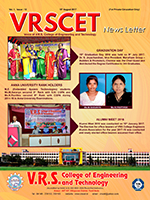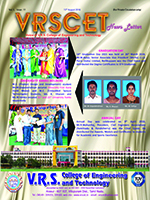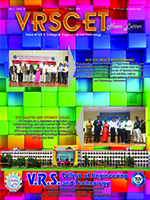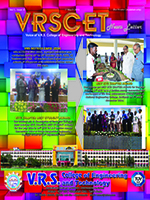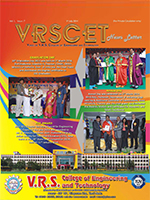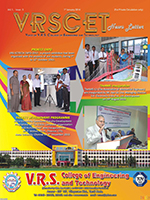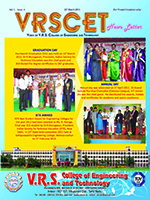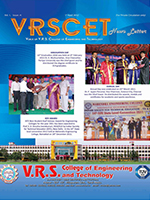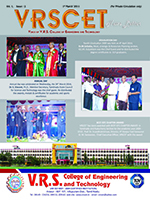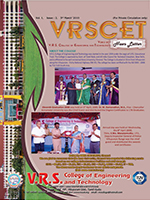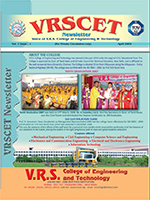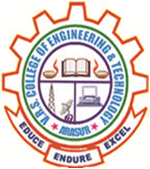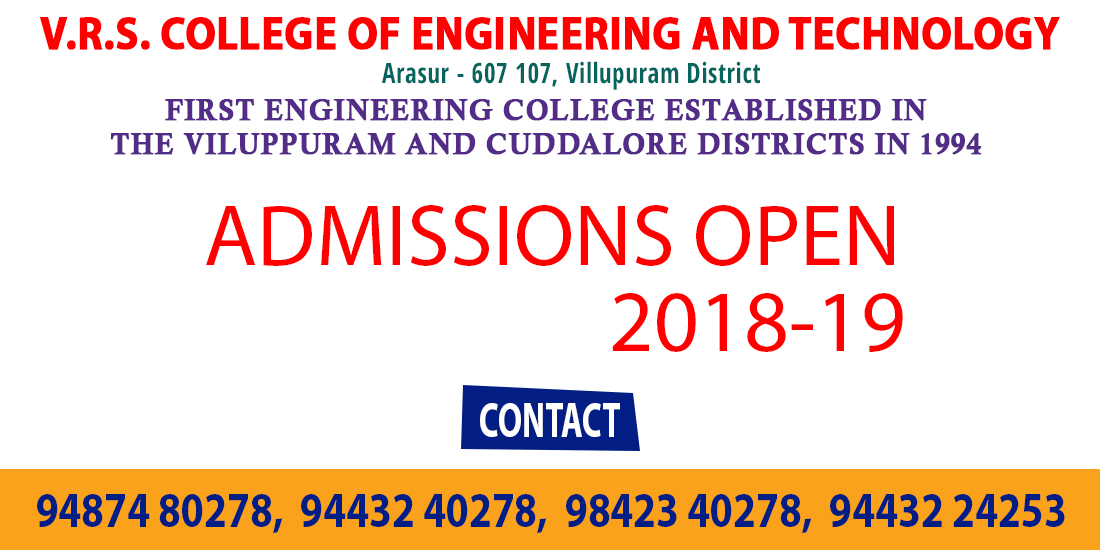-
DEPARTMENT PROFILE Department of Electronics and Communication Engineering was established in the year 1994 with the vision of developing the department as a Center of Excellence in the field of Electronics and Communication Engineering and makes the students blossom in to meritorious and self discipline. The department is certified by ISO 9001:2008. The department has well qualified, experienced teaching faculty and supporting faculty, to impart knowledge and skills. The department conducts National level technical symposium every year for students and also Organizes faculty development programs, guest lectures, seminars, workshops, basic skill development programs, industrial visits to update the student’s skills. We also encourage the students in the extracurricular activities like Sports, Culturals etc., The overall focus of the department is to • Emphasis elemental knowledge of the subjects. • Provide exposure to the emerging technology. LABORATORY FACILITY The department is well equipped with state of the art laboratories and infrastructural facilities. The students get a wide exposure and practical hands on training with the classy equipment during their lab sessions. A standby power generator is provided in the campus to take care of the occasional power shut down so that the students can able to complete their lab exercises without any disruption. COMPUTER FACILITY IN THE DEPARTMENT VLSI laboratory is outfitted with 30 higher end systems with licensed cadence software. DSP laboratory is also furnished with 30 higher end systems with licensed MATLAB-2009 and a version including Digital Signal Processing tool Box, Control System tool Box, Communication Tool Box. DEPARTMENT LIBRARY The department Library has a collection of 319 volumes in 30 different areas like Electromagnetic Fields, Signals and Systems, Image Processing, Networks, Radar and Satellite Communication, Microwave & Optical Communication, Wireless Communication, VLSI, Basic and Integrated Electronics, Analog and Digital Communication etc., apart from this, UG projects reports of ECE department are kept for reference in the department Library. In addition to this course file of each theory courses and compact discs containing video lectures of prominent professors are also kept for reference. Books are issued to Faculty members and Students of all the departments. CLASSROOM FACILITY Classrooms are spacious so that the students are seated compactly to view the projected images on the screen and chalk board. Rest rooms and purified drinking water facilities are also available and located near the class rooms. INTERNET FACILITY The department has internet facility though Wi-Fi system providing high speed connectivity (8MBps). The students and faculties can surf the internet together for unlimited information. The systems in the internet laboratory are provided with latest Audio Visual Aids. FIRE EXTINGUISHER All the Laboratories have separate fire extinguishers at the entrances. INDUSTRIAL VISITS Industrial visits are arranged every year in order to impart the knowledge out-of-the box teaching and to focus on day-to-day functions of the industries like ISRO – Bangalore, Radio Astronomy Centre – Ooty to understand its operational issues. SOFT SKILL Soft skill training programme composed of skills, abilities and traits that pertain to personality, attitude and behavior. It is the ability required for the students to find suitable job, its maintenance and promotion. Our department students get benefited through the untied effort of well trained soft skills trainers. MEMORANDUM OF UNDERSTANDING (MoU) The department has signed MoUs with many Central Government Organizations like National Small Industries Corporation (NSIC), Chennai to upgrade the quality of the students for making them industry related experience by arranging in-plant training, industrial visits, mini projects & major projects. ADD-ON COURSES The students gain knowledge in their specialized area by conducting such a valuable add-on courses in our institution. These courses offer a best platform for their career and apply these technical skills in order to get god placement. The courses like VLSI design, Embedded Systems and Networking are conducted for the final year and pre-final year students in an endeavor to open up a wide variety of job opportunities in the stream of industries and also in self employment basis. ORGANIZING PROGRAMS The department has committed and competent teachers striving hard for the betterment of (Rural) Students community. The department consistently organizes seminars sponsored by ISTE, Faculty Development Programmes sponsored by Anna University and other organizations; self sponsored National workshops and student symposiums to update the knowledge of the students with the rising technologies. PLACEMENT & HIGHER STUDIES Training & Placement Department has a significant role to play in student’s future as it serves as an indispensable pillar of the Institute. The undergraduates from our department have become professional engineers employed both in core and software companies such as Hexaware Technologies, Cognizant Technology Solutions (CTS), Aircel India Private Limited, Wipro, Tata Consultancy Services (TCS), HCL Technologies etc., Many of our students pursue higher education to obtain M.E., MBA and Ph.D. degrees in Foreign Universities. One of our students named Mr. N. Anandhabaskaran obtained his Master degree from Madrid University, Spain. BEST DEPARTMENT AWARD ECE department has received Best Department Award in the year 2013 for producing highest percentage of result in the Anna University Examinations (April/May 2012 & Nov/Dec 2012) among all other departments and rewarded with Gold ring worth of Rs. 7,000/-. FACULTY AWARDS Mr.R.Balasubramaniyan had received ‘ISTE Best Chapter Secretary Award’ among all the Engineering Colleges of Tamil Nadu and Puducherry Section for the year 2013, during 16th ISTE State Level Faculty Convention held on 11th January 2014 at Excel College of Engineering & Technology, Komarapalayam. Ms.S.Jayalilly had received ‘ISTE Best Faculty Advisor Award’ among all the Engineering Colleges of Tamil Nadu and Puducherry Section for the year 2015, during 18thISTE State Level Faculty Convention held on 11th December 2015 at KPR Institute of Engineering & Technology, Coimbatore. MISSION 10X Mission 10X chose to enhance the Graduate Engineering Attributes Viz., Deeper Learning, Communication Skills and Team Work in students to achieve quality of engineering. Most of our faculties have been certified by Wipro – Mission 10X advanced teaching and learning methodologies. It exposes the faculty members to present in advanced ways of teaching. It aims to move from a chalk and talk approach to more iterative methods. It helps our faculties to build a bond with their students and work together towards a common goal. International Organization for Standardization (ISO) Certification VRSCET is one of the earliest institutes to be awarded with ISO 9001:2008 certificate and all the activities and process of the department comply with the ISO 9001:2008 standards. The continual improvement of the management, academic and support activities in the college are reviewed every year by External auditors from TUV SUD, south Asia. STUDENTS PROJECTS The college and department encourages the final year students to do their projects in Government Enterprises like National Small Industries Corporation (NSIC), Chennai and Telecommunications Consultants India Limited – IT (TCIL-IT), Puducherry to strengthen the linkages between theoretical concepts with the practical applications to explore their career fields. The department also motivates the students to explore their projects in the project competitions such as TNSCST Student Projects Scheme and Science Model Competition Conducted by the Science City. RESEARCH AND PUBLICATIONS TNSCST sponsored one day National level workshop on 23rd May 2017
– Tamil Nadu State Council for Science and Technology (TNSCST) sponsored One day National level workshop was conducted jointly with Research and Development Committee on 23rd May 2017.
– Dr. D. Sriram Kumar, Associate Professor, Department of Electronics and Communication Engineering, National Institute of Technology, Trichy and Dr. V. Saminadan, Professor, Department of Electronics and Communication Engineering, Pondicherry Engineering College, Puducherry delivered guest lectures on “Modern Trends in Fiber Optic Communication”.
– There were more than 50 participants including Academicians, Research scholars and PG students from various engineering institutions.
This Workshop gives an overview of fiber optic communication systems including their key technologies, and also discusses their technological trend towards the next generation.
• Basic Fundamentals of Optics communication.
• Technology trends toward the next generation.
• Visible light communication.
• All Optical networks.
• Hands on training – OptSim
TNSCST sponsored one day National level Seminar on 24th May 2017
– Tamilnadu State Council for Science and Technology (TNSCST) sponsored one day National level Seminar was conducted jointly with Research and Development Committee on 24th May 2017.
– Dr. P. Sampathkumar, Associate Professor, Department of CAS-Marine Biology, Annamalai University, Chidambaram delivered a guest lecture on “Biomod-A platform for Disentangling Biodiversity Effects on Ecosystem functioning and Deriving solutions to a seemingly Insurmountable Problem”.
– There were more than 50 participants included Academicians, Research scholars and PG students from various engineering institutions.
This Seminar was intended to provide the participants a brief idea about the BIOMOD platform and environmental conditions like El nino, La nina and ENSO. The seminar was organized around the following themes:
• Biomod & its applications.
• Eco system functioning.
• Awareness on the impacts of El Nino, La Nina and various environmental defects.
• Preventive measures to protect the biodiversity.
• Deriving solutions to insurmountable problems faced in biodiversity.
TNSCST sponsored one day National level seminar on 25th May 2017
– Tamilnadu State Council for Science and Technology (TNSCST) sponsored one day National level seminar was conducted jointly with Research and Development Committee on 25th May 2017.
– Mrs.T.Perarasi, Associate Professor, Department of Electronics and Communication Engineering, Karpaga Vinayagar Engineering College, Chennai and Dr.G.Nagarajan, Professor, Department of Electronics and Communication Engineering, Pondicherry Engineering College, Pondicherry delivered guest lectures on “Recent Trends in Cognitive Networks”.
This Seminar was intended to provide the participants a brief idea about the fundamentals of radio-spectrum sensing, spectrum decision, spectrum sharing and spectrum mobility in cognitive radio. The seminar was organized around the following themes
• Fundamentals and recent developments of cognitive communication.
• Radio spectrum sensing.
• Spectrum decision and Spectrum sharing.
• Spectrum mobility and Spectrum Management.
• Security issues in Cognitive networks.
Anna University, Centre for Faculty Development, Chennai Sponsored One Week FDP
– Anna University, Centre for Faculty Development, Chennai Sponsored One Week Faculty Development Program on ‘EC6303: Signals and Systems’ from 2nd to 8th June 2014.
APPRECIATION TO STAFF AND STUDENTS Our Management genuinely appreciates the faculties who produced highest pass percentage in the Anna University Examination results to encourage the faculties to exhibit a positive attitude among themselves and in turn towards the students. APPRECIATION TO STUDENTS Best performing students [securing more than 9.00 CGPA] in the Anna University Examination are awarded with Gold ring with Rs. 7,000/- in order to encourage and motivate them to show their talents in future also. PAPER PUBLICATION The department of ECE has created a platform for the staff and students to prove their talents in order to outperform themselves and unfold their creative impulse by means of publications. It enlightens the students and faculties on the latest technological developments and thus drives innovation. -
Vision
Generation of dynamic technologists in the field of Electronics and Communication Engineering to meet the future demands and expectations of the world.
Mission
Formulating and implementing quality teaching methodologies to ensure student centered teaching- learning processes.Continuous improvements in academic methodologies to create conducive environment for learning and to maximize the number of students, securing University Ranks and opting for Higher education.Enhancement of industry-institute interaction by conducting add-on programmes to cater the expectations of industries, permitting students to go for in-plant training and to do industry oriented innovative projects, which will lead to better job opportunities to students. -
Programme Educational Objectives & Programme Outcomes
Programme Educational Objective [Major]
To impart basic technical knowledge and practical skills in the field of Electronics and Communication Engineering which lead to promotion of successful engineering design, establishment of engineering standards and overcoming of realistic constraints in systematic engineering processes with incorporation of industries expectations.
Programme Educational Objectives [PEOs]
The educational objectives of UG program in Electronics and Communication Engineering are:
P1: PREPARATION
To provide sound foundation in mathematical, scientific and engineering fundamentals necessary to analyze, formulate and solve engineering problems.
P2: CORE COMPETANCE
To provide thorough knowledge in Electronics and Communication Engineering subjects including theoretical knowledge and practical training for preparing physical models pertaining to Electronic Circuits and design, Digital Signal processing, Microprocessor / Microcontroller internal architecture and its programming, Wireless and wired Communication, Networking, Microwave Engineering, VLSI etc.
P3: DESIGN COMPETANCE
To provide relevant engineering experience in designing and conducting experiments as well as analyzing the significance of the experimental data.
P4: SOFT SKILL
To provide training in soft skills via English language, communication, verbal, logical, analytical, comprehension, team building, inter personal relationship, group discussion etc for placement.
P5: CAREER DEVELOPMENT
To inculcate the habit of lifelong learning for career development through successful completion of advanced degrees, professional development courses, industrial training etc.
P6: PROFESSIONALISM
To impart technical knowledge, ethical values for professional development of the student to solve complex problems and to work in multi disciplinary ambience, whose solutions lead to significant societal benefits.
Programme Outcomes (POs)
The outcomes of departments are that the students after successful completion of the course will acquire:
-An ability to apply knowledge in mathematics, science and engineering subjects.
-An ability to identify, formulate and solve engineering problems.
-An ability to design and conduct experiments to interpret data and analyze the results.
-An ability to apply knowledge in mathematics, science and engineering subjects.
-An ability to design system components or processes to satisfy the needs of the society within realistic constraints such as economical, social, political, ethical, health, safety and manufacturing.
-An ability to function on multi-disciplinary teams.
-An ability to understand professional and ethical responsibilities.
-An ability to communicate effectively.
-An ability to gain knowledge to understand the impact of engineering solutions in a global, environmental and societal context.
-An ability to understand the need and engage in life-long learning process.
-To gain knowledge on contemporary issues.
-An ability to use techniques, skills and modern engineering tools necessary for engineering practice. . S.NO Name Position 1 Mr. G. Sadiq Basha , M.Tech.,(Ph.D.), Head of the Department (i/c) 2 Dr. J. Joseph Ignatious, M.E., Ph.D., Professor 3 Mrs. V. Gandhimathi, M.Tech., Associate Professor 4 Mrs. P. Sujatha, M.E., Associate Professor 5 Mr. S. Parthiban, M.Tech., (Ph.D.), Assistant Professor 6 Mrs. T. Priyadharshini, M.E., (Ph.D.), Assistant Professor 7 Ms. G. Indumathi, M.E., Assistant Professor 8 Mr. R. Rajendran, M.E., Assistant Professor 9 Ms. R. Keerthiga, M.E., Assistant Professor NEWSLETTER
